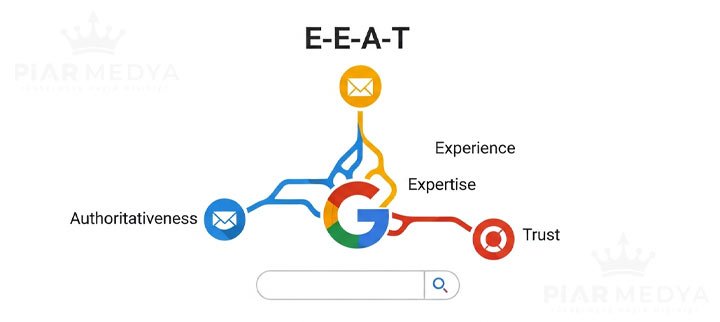What is E-E-A-T? The 4 Golden Rules of Building Trust on Google
What is Google E-E-A-T? Learn how to boost your SEO performance and make your site authoritative with the criteria of Experience, Expertise, Authoritativeness, and Trustworthiness. You will find answers to all your questions related to topic What is E-E-A-T? The 4 Golden Rules of Building Trust on Google in the continuation of the text.

What is E-E-A-T? (Short and Clear Definition)
What Are E-E-A-T Signals? Analysis of the 4 Basic Criteria
1. Experience: "Have You Lived This?"
2. Expertise: "Do You Know This?"
3. Authoritativeness: "Do Others Know You?"
4. Trustworthiness: "Can I Trust You?"
3 Strategic Moves to Increase Your E-E-A-T Score
1. Create a Transparent "About Us" and "Author" Page
2. Manage Your Online Reputation and Reviews
3. Keep Your Content Up-to-Date and Comprehensive
Conclusion: Trust is the Biggest Ranking Factor
Google is much more than a search engine; it is a "trust" engine. When users search for a health issue, a financial decision, or technical information, they want to believe that the result they encounter comes from an accurate, reliable, and expert source. The set of criteria Google uses to measure this trust is called E-E-A-T (Experience, Expertise, Authoritativeness, Trustworthiness).
In the past, it was possible to rank just with keywords. But today, especially in an era where artificial intelligence content is increasing, "who" wrote the content and "with what experience" is of vital importance. At Piar Medya, we focus on brand authority as much as technical optimization in all our SEO work.
In our guide, we will analyze E-E-A-T signals and examine how to increase your site's reputation in Google's eyes.
What is E-E-A-T? (Short and Clear Definition)
E-E-A-T is an acronym formed by the initials of four fundamental criteria Google uses to measure the quality of a website or content. Google wants to ensure that the information it presents to its users is accurate, safe, and comes from an expert. Therefore, algorithms score your site under these four headings:
- Experience
- Expertise
- Authoritativeness
- Trustworthiness
In short, E-E-A-T is Google asking you, "Who are you, do you really know this topic, and why should I trust you?" As Piar Medya, we optimize these trust signals as much as the technical infrastructure in our SEO services.
What Are E-E-A-T Signals? Analysis of the 4 Basic Criteria
These four letters, stated in Google's Search Quality Rater Guidelines, are the fundamental building blocks that determine your site's quality:
1. Experience: "Have You Lived This?"
This criterion questions whether the content creator has first-hand experience with the subject. For example, if you are writing an iPhone review, Google wants to understand if you have actually held that phone in your hand.
Tip: Use phrases like "my own experience," "our observation" in your content and add original images.
2. Expertise: "Do You Know This?"
This is the author's level of knowledge about the subject. For Google, there is a big difference between a doctor writing a medical article and someone writing it for hobby purposes.
Tip: Strengthen author bios. If you are writing about digital marketing, showcase your certifications or past successes.
3. Authoritativeness: "Do Others Know You?"
This expresses the reputation of your site or author in the industry. Do other authoritative sites refer to you? Are you seen as a "source" in the industry?
Tip: Get references from other reliable sites in your industry through quality backlink work.
4. Trustworthiness: "Can I Trust You?"
This is the most important part of E-E-A-T. Your site's security, transparency, and the accuracy of contact information fall under this item.
Tip: Use an SSL certificate, state your physical address, and create a clear "About Us" page.
3 Strategic Moves to Increase Your E-E-A-T Score
There is no direct "E-E-A-T score" in Google's algorithm, but the algorithm scans these signals. Here are ways to strengthen these signals:
1. Create a Transparent "About Us" and "Author" Page
The era of anonymous content is over. Users and Google want to see the person behind the content. Explain your vision, team, and areas of expertise in detail on your About Us page. Add a box stating the author's expertise at the bottom of every blog post.
2. Manage Your Online Reputation and Reviews
Google also considers what is being said about your brand outside the site (off-page signals). Reviews on Google Maps, review sites like Trustpilot, or forums affect your trustworthiness score. Therefore, conducting a professional online reputation management process is also critical for SEO success.
3. Keep Your Content Up-to-Date and Comprehensive
Old, incorrect, or superficial information damages trust. Especially in the era of Google AI Overviews, the depth and currency of your content are the biggest factors for being cited as a reference. Update your content regularly and write by citing sources.
Conclusion: Trust is the Biggest Ranking Factor
E-E-A-T is not a technical setting; it is the character of your digital presence. When you prove your expertise to Google and your users, ranking increases will come naturally. Get a quote now from Piar Medya's expert team to transform your site into an information authority and build a trust-focused SEO strategy.






